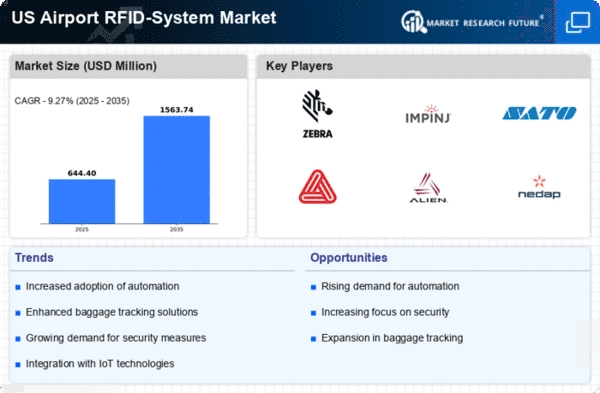Cost Reduction and Return on Investment
The airport RFID-system market emphasizes cost reduction and return on investment (ROI). Airports are increasingly recognizing the long-term financial benefits of implementing RFID technology. By minimizing baggage mishandling and optimizing resource allocation, RFID systems can lead to substantial cost savings. Studies suggest that airports can achieve an ROI of up to 200% within a few years of implementing RFID solutions. This financial incentive is likely to encourage more airports to invest in RFID technology, further driving growth in the market.
Increased Focus on Passenger Experience
In the airport rfid-system market, there is a notable shift towards improving passenger experience. Airports are leveraging RFID technology to provide real-time information on baggage status and streamline check-in processes. Enhanced visibility into baggage handling allows passengers to track their luggage, reducing anxiety and improving overall travel satisfaction. Reports indicate that airports utilizing RFID systems have seen a 20% increase in positive passenger feedback. This focus on customer experience is likely to drive further investments in RFID solutions, as airports seek to differentiate themselves in a competitive market.
Growing Demand for Operational Efficiency
The airport rfid-system market is experiencing a surge in demand driven by the need for enhanced operational efficiency. Airports are increasingly adopting RFID technology to streamline processes such as baggage handling, passenger tracking, and asset management. This technology reduces the time taken for various operations, thereby improving overall airport throughput. According to recent data, airports that have implemented RFID systems report a reduction in baggage mishandling by up to 30%. This efficiency not only enhances customer satisfaction but also leads to cost savings, making RFID systems a vital component in modern airport operations.
Regulatory Compliance and Safety Standards
The airport RFID-system market is significantly influenced by the need for compliance with regulatory standards. This includes safety protocols. As security concerns continue to rise, airports are mandated to adopt technologies that enhance safety and tracking capabilities. RFID systems provide a robust solution for meeting these compliance requirements, enabling airports to maintain accurate records of baggage and cargo movements. The implementation of RFID technology can assist airports in adhering to regulations set forth by the Transportation Security Administration (TSA) and other governing bodies, thereby reducing the risk of penalties and enhancing operational integrity.
Technological Advancements in RFID Solutions
Technological advancements are propelling the airport rfid-system market forward. Innovations in RFID technology, such as the development of more efficient tags and readers, are enhancing the capabilities of existing systems. These advancements allow for faster data processing and improved accuracy in tracking. The integration of advanced analytics and machine learning with RFID systems is also emerging, providing airports with valuable insights into operational performance. As these technologies evolve, they are expected to drive further adoption of RFID solutions, positioning them as essential tools for modern airport management.
















